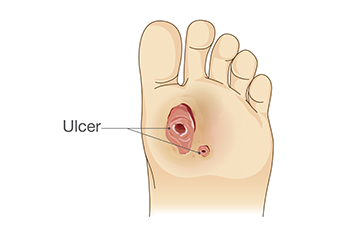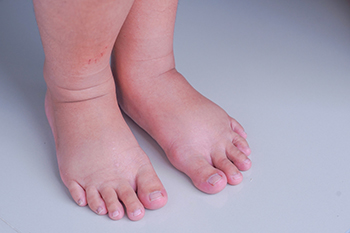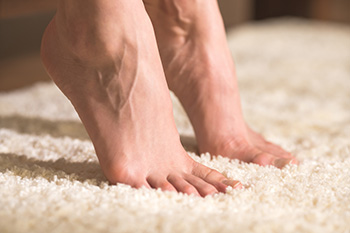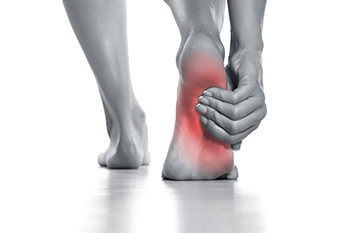
(616) 846-3400
Fax: (616) 846-3406

(616) 846-3400
Fax: (616) 846-3406

Diabetes affects the body's ability to heal foot wounds due to its impact on metabolizing glucose. High blood sugar levels hinder wound healing by preventing efficient nutrient and oxygen delivery, reducing immune system function, and increasing inflammation. Peripheral neuropathy, common in diabetes, can lead to reduced sensation in the feet, making foot wounds more prevalent. Poor circulation, often linked to diabetes, further impairs healing by reducing blood flow and affecting red blood cell function. Immune system deficiencies in diabetes hinder the body's ability to heal foot wounds and increase the risk of infection. Elevated blood sugar levels also promote bacterial growth, worsening the risk of infection. To aid in foot wound healing, performing regular self-foot checks are crucial in detecting wounds early. Removing dead tissue, keeping dressings fresh, and avoiding pressure on the wound can facilitate healing. If you experience symptoms such as tingling, burning, or persistent pain, or if your foot wound worsens, it is suggested that you make an appointment with a podiatrist as quickly as possible who can help you manage this serious condition.
Wound care is an important part in dealing with diabetes. If you have diabetes and a foot wound or would like more information about wound care for diabetics, consult with Dr. Robbi Young from Grand Haven Foot & Ankle. Our doctor will assess your condition and provide you with quality foot and ankle treatment.
What Is Wound Care?
Wound care is the practice of taking proper care of a wound. This can range from the smallest to the largest of wounds. While everyone can benefit from proper wound care, it is much more important for diabetics. Diabetics often suffer from poor blood circulation which causes wounds to heal much slower than they would in a non-diabetic.
What Is the Importance of Wound Care?
While it may not seem apparent with small ulcers on the foot, for diabetics, any size ulcer can become infected. Diabetics often also suffer from neuropathy, or nerve loss. This means they might not even feel when they have an ulcer on their foot. If the wound becomes severely infected, amputation may be necessary. Therefore, it is of the upmost importance to properly care for any and all foot wounds.
How to Care for Wounds
The best way to care for foot wounds is to prevent them. For diabetics, this means daily inspections of the feet for any signs of abnormalities or ulcers. It is also recommended to see a podiatrist several times a year for a foot inspection. If you do have an ulcer, run the wound under water to clear dirt from the wound; then apply antibiotic ointment to the wound and cover with a bandage. Bandages should be changed daily and keeping pressure off the wound is smart. It is advised to see a podiatrist, who can keep an eye on it.
If you have any questions, please feel free to contact our office located in Grand Haven, MI . We offer the newest diagnostic and treatment technologies for all your foot care needs.

Pregnancy is a remarkable journey that brings joy and anticipation. However, along with the many changes within the body, some discomforts can arise, including foot pain. This type of pain is common, and understanding its causes can help expectant mothers better manage it. One of the primary reasons for foot pain during pregnancy is the increased weight and pressure placed on the feet. As the baby grows, so does the strain on the feet which could lead to arch and heel pain. Hormonal changes also play a role, as they can cause ligaments to become more relaxed, leading to instability in the feet. Swelling, a common pregnancy symptom, can also contribute to foot pain. Fluid retention causes the feet to swell, which can lead to discomfort and pressure on the arches. Finally, changes in gait and posture during pregnancy can lead to altered weight distribution, potentially causing pain in various areas of the feet. In conclusion, foot pain during pregnancy is a common but manageable issue. Understanding its causes can empower expectant mothers to take steps to alleviate discomfort and ensure a more pleasant pregnancy experience. If you would like to have additional information about foot pain during pregnancy, it is suggested that you consult a podiatrist.
Pregnant women with swollen feet can be treated with a variety of different methods that are readily available. For more information about other cures for swollen feet during pregnancy, consult with Dr. Robbi Young from Grand Haven Foot & Ankle. Our doctor will attend to all of your foot and ankle needs.
What Foot Problems Can Arise During Pregnancy?
One problem that can occur is overpronation, which occurs when the arch of the foot flattens and tends to roll inward. This can cause pain and discomfort in your heels while you’re walking or even just standing up, trying to support your baby.
Another problem is edema, or swelling in the extremities. This often affects the feet during pregnancy but tends to occur in the later stages.
How Can I Keep My Feet Healthy During Pregnancy?
If you have any questions please feel free to contact our office located in Grand Haven, MI . We offer the newest diagnostic and treatment technologies for all your foot and ankle needs.

The bones in your toes are called phalanges, consisting of two or three segments, depending on the toe. These toe bones connect to the metatarsals in your foot through joints with cartilage that allows for smooth movement. Further, the body produces a fluid known as synovium to lubricate these joints and facilitate ease of motion. While toes lack muscles, the tendons and ligaments connect them to muscles in your foot and legs, allowing for movement. Over time, factors like extended standing, running, or ill-fitting shoes can cause toe misalignment. Toe exercises are effective in realigning them, alleviating discomfort, and enhancing overall foot health. Cramped toes can be quite uncomfortable and painful. Stretching exercises help in relaxing your toes, and relieving tension and discomfort. Toe stretches enhance their flexibility, making them more adaptable and less prone to stiffness. Toe exercises also stimulate increased blood flow, which can effectively alleviate pain and reduce swelling. Flexible toes are less susceptible to injuries, making toe exercises essential to injury prevention. If you have toe pain that inhibits your daily activities, it is suggested that you make an appointment with a podiatrist.
Exercising your feet regularly with the proper foot wear is a great way to prevent injuries and build strength. If you have any concerns about your feet, contact Dr. Robbi Young from Grand Haven Foot & Ankle. Our doctor can provide the care you need to keep you pain-free and on your feet.
Exercise for Your Feet
Exercise for your feet can help you gain strength, mobility and flexibility in your feet. They say that strengthening your feet can be just as rewarding as strengthening another part of the body. Your feet are very important, and we often forget about them in our daily tasks. But it is because of our feet that are we able to get going and do what we need to. For those of us fortunate enough to not have any foot problems, it is an important gesture to take care of them to ensure good health in the long run.
Some foot health exercises can include ankle pumps, tip-toeing, toe rises, lifting off the floor doing reps and sets, and flexing the toes. It is best to speak with Our doctor to determine an appropriate regimen for your needs. Everyone’s needs and bodies are different, and the activities required to maintain strength in the feet vary from individual to individual.
Once you get into a routine of doing regular exercise, you may notice a difference in your feet and how strong they may become.
If you have any questions please feel free to contact our office located in Grand Haven, MI . We offer the newest diagnostic and treatment technologies for all your foot and ankle needs.

Pain in the arch of the foot can affect daily activities and cause discomfort. A common cause of arch pain is plantar fasciitis, which often occurs due to flat feet. This condition involves the overstretching of the plantar fascia, leading to morning pain and discomfort in the heel. Stress fractures are another typical source of arch pain, arising from repetitive force, especially in high-impact activities. Flat feet, or fallen arches, can contribute to arch pain as well. When the arches collapse while walking or standing, it can cause discomfort. Managing this condition involves shoe adjustments, using inserts, and incorporating periods of rest. Posterior tibial tendonitis is another cause of arch pain. It results from overuse of the tibialis posterior muscle, particularly after extended periods of standing. Treatment options include rest, specific exercises, and the use of compression. Foot cramps can also lead to arch pain. Wearing ill-fitting shoes that lack arch support is another contributor to arch pain. Underlying medical conditions like arthritis, diabetes, and obesity can weaken bones and tendons, leading to arch pain. If you suffer from pain in the arches of the feet, it is suggested that you make an appointment with a podiatrist for diagnosis and treatment.
Foot Pain
Foot pain can be extremely painful and debilitating. If you have a foot pain, consult with Dr. Robbi Young from Grand Haven Foot & Ankle. Our doctor will assess your condition and provide you with quality foot and ankle treatment.
Causes
Foot pain is a very broad condition that could be caused by one or more ailments. The most common include:
Diagnosis
To figure out the cause of foot pain, podiatrists utilize several different methods. This can range from simple visual inspections and sensation tests to X-rays and MRI scans. Prior medical history, family medical history, and any recent physical traumatic events will all be taken into consideration for a proper diagnosis.
Treatment
Treatment depends upon the cause of the foot pain. Whether it is resting, staying off the foot, or having surgery; podiatrists have a number of treatment options available for foot pain.
If you have any questions, please feel free to contact our office located in Grand Haven, MI . We offer the newest diagnostic and treatment technologies for all your foot care needs.